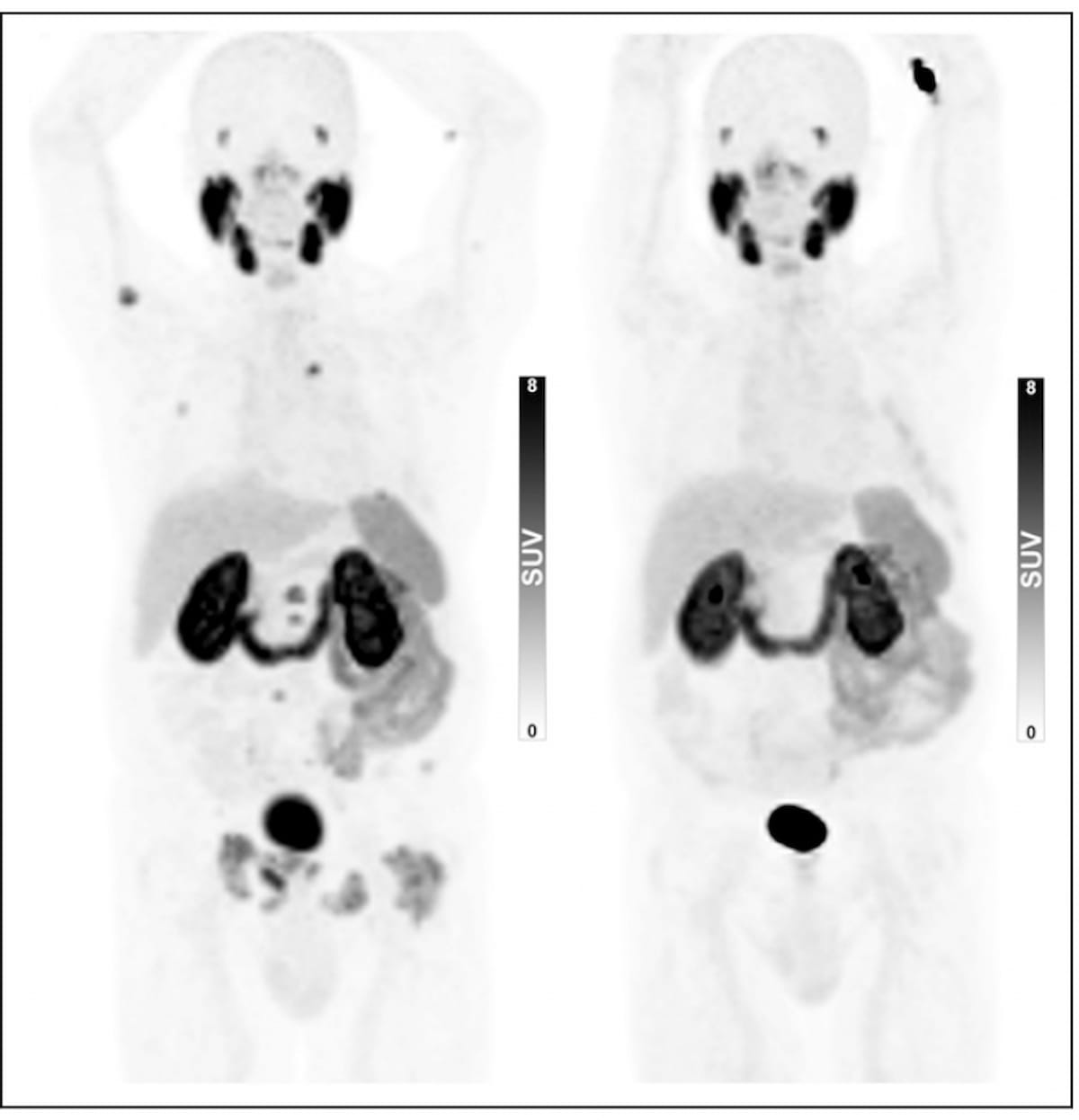Is Pre-Imaging Biopsy Necessary for Prostate Cancer Staging in Elderly Patients?
For patients 80 years of age or older that have a PSA level at 20 ng/mL or higher, PSMA PET/CT has a high likelihood of success in diagnosing and staging prostate cancer regardless of pre-imaging biopsy use, according to newly published research.
Emerging research revealed that approximately one-third of elderly patients did not have a prostate biopsy prior to being referred for PSMA positron emission tomography/computed tomography (PET/CT) for prostate cancer assessment.
Noting that prostate biopsies for elderly patients have the potential for elevated risks such as infection as well as longer hospital stays, researchers assessed the use of pre-imaging biopsies or lack thereof in 100 patients 80 years of age or older who had prostate cancer staging with 68Ga-PSMA-11 PET/CT.
For the retrospective study, recently published in the Journal of Nuclear Medicine, researchers found that 34 percent of the study cohort did not have a biopsy prior to being referred for PSMA PET/CT. In addition to being five years older on average in comparison to patients who had prostate biopsies, patients without pre-imaging biopsies had significantly higher prostate-specific antigen (PSA) levels (a median PSA level of 57 ng/mL vs. 15.4 ng/mL).
One can see 68Ga-PSMA-11 PET/CT scans above for an 83-year-old man who had no pre-imaging biopsy. The initial imaging (left) shows advanced prostate cancer and the right image, obtained 10 months later and after the patient underwent hormonal therapy, shows no uptake of 68Ga-PSMA-11. (Images courtesy of the Journal of Nuclear Imaging.)

The 68Ga-PSMA-11 PET/CT imaging also revealed that patients without a pre-imaging biopsy had nearly a 19 percent higher rate of bone metastases (47.1 percent vs. 28.8 percent) and a nearly 17 percent higher prevalence of advanced disease (50 percent vs. 33.3 percent) in comparison to patients that had pre-imaging biopsies.
“The results of the current study indicate that 100% of the elderly patients who were referred for PSMA PET/CT on the basis of clinical suspicion only (mainly a rising PSA level or prominent urinary or musculoskeletal symptoms) were found to have avid disease on PSMA PET/CT,” wrote study co-author Einat Even-Sapir, M.D., Ph.D., head of the Department of Nuclear Medicine at Tel Aviv Sourasky Medical Center in Israel, and colleagues.
“Given that positive PSMA PET/CT results usually indicate clinically significant rather than clinically insignificant PCa, and together with insignificant negative biologic effect of radiation exposure in elderly patients, this practice of waiving the need for (pre-imaging) biopsy when the clinical suspicion is high proves to be effective and to have no apparent negative cost.”
In regard to treatment, the researchers noted that out of 36 patients who had localized prostate cancer, 81.5 percent of patients who had pre-imaging biopsies (22 of 27 patients) were referred for definitive therapies whereas none of the nine patients with no pre-imaging biopsies received definitive treatment. For locally advanced prostate cancer, 12.5 percent of the patients without pre-imaging biopsy had pelvic radiotherapy in comparison to 88.2 percent of patients with pre-imaging biopsy.
However, the study authors noted significantly lower age and PSA levels in the patients treated with pelvic radiotherapy for locally advanced prostate cancer. Even-Sapir and colleagues also pointed to follow-up data for 12 out of 13 patients in the no pre-imaging biopsy group who were treated with hormonal therapy for advanced disease. A mean PSA level decrease of 95.6 percent occurred for these patients and eight out nine patients with follow-up PSMA PET/CT achieved a significant decrease in disease or a stable level of disease, according to the study authors.
“When PSMA PET/CT identified advanced disease in patients who had no (pre-imaging) biopsy, as happened in half of such patients in the current study, our results indicate that the lack of tissue diagnosis did not preclude them from receiving hormonal therapy, which biochemical and imaging follow-up data indicated had been beneficial,” emphasized Even-Sapir and colleagues.
Multinational Study Reaffirms Value of Adjunctive AI for Prostate MRI
June 16th 2025The use of adjunctive AI in biparametric prostate MRI exams led to 3.3 percent and 3.4 percent increases in the AUC and specificity, respectively, for clinically significant prostate cancer (csPCa) in a 360-person cohort drawn from 53 facilities.
New PSMA PET Prep Product Now Available in the U.S.
June 11th 2025Offering an extended shelf life, the FDA-approved Gozellix, a preparation kit for gallium-68 (68Ga) gozetotide injection, is indicated for use in PSMA PET imaging of prostate cancer patients with suspected recurrence or metastasis.
Study: AI-Generated ADC Maps from MRI More Than Double Specificity in Prostate Cancer Detection
June 5th 2025Emerging research showed that AI-generated ADC mapping from MRI led to significant increases in accuracy, PPV and specificity in comparison to conventional ADC mapping while achieving a 93 percent sensitivity for PCa.
ASCO: Study Reveals Significant Racial/Ethnic Disparities with PSMA PET Use for Patients with mPCa
May 30th 2025Latinx patients with metastatic prostate cancer were 63 percent less likely than non-Hispanic White patients to have PSMA PET scans, according to a study of 550 patients presented at the American Society of Clinical Oncology (ASCO) conference.
What a New PSMA PET/CT Study Reveals About Local PCa Treatment and High-Risk Recurrence
May 16th 2025For patients at high-risk for biochemical recurrence of prostate cancer, PSMA PET/CT findings revealed that 77 percent had one or more prostate lesions after undergoing local radiation therapy or radical prostatectomy, according to a recent study.